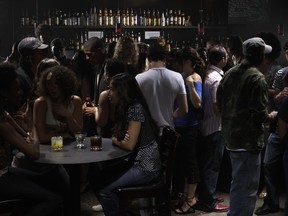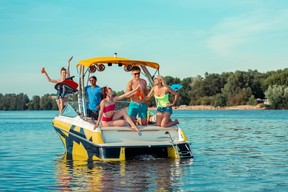Over-serving customers comes with great legal risks, personal injury lawyer warns
Severity of injuries resulting from impaired driving can be catastrophic, says founder of law firm which has expanded into GTA in recent years

Article content
With the arrival of patio season, personal injury lawyer Brenda Hollingsworth advises it’s important for both patrons and bar/restaurant owners alike to understand the legal implications of alcohol being over-served.
She says without exception the biggest damages amount her firm has received for their clients involve impaired drivers.
“There is something about intoxicated drivers that seems to up the ante in terms of the severity of injuries,” she explains, citing speed, slow reaction times and bad judgment as “a recipe for a disaster.”
When a drunk driver is on the road after being overserved by an establishment that is legally obligated to ensure their customers don’t cause harm to self or others, the establishment must be held accountable.
“We’re there to make sure that happens,” says Hollingsworth, who with husband Richard Auger founded Auger Hollingsworth Injury and Accident Lawyers in 2005.
Their personal injury law firm served mostly Eastern Ontario at that time. They began their expansion into the GTA in late 2019 and now have offices in Hamilton, Mississauga, Brampton, Barrie, Toronto and two in Ottawa.
“Tavern liability refers to the responsibility of establishments that are licensed to serve alcohol not to overserve patrons to the point where they are at risk to themselves and others,” she explains. “The liability comes from both statute (Liquor Licence Act) and the decisions of the courts.”

Bar and restaurant owners need to embrace and follow the principles taught in Ontario’s Smart Serve program, Hollingworth urges.
“They need to keep track of how many drinks they have served their customers, including customers who have been drinking before they arrive,” she says, adding they have to learn and watch for the subtle and not-so-subtle indicators of intoxication, along with monitoring how their customers are getting home.
“Calling an Uber or a taxi, confiscating car keys and even phoning the police if required are all fair game if you are going to profit from selling alcohol,” she says.
Hollingsworth recalls one client who was a new father, about to get married. His buddy took him out to a local bar to watch a pay-per-view fight.
“It was always the plan for my client to walk home since it wasn’t far,” she describes. “However, after several pitchers of beer, that plan evaporated and he got into his drunk friend’s car.”
They drove into the side of a building and her client was catastrophically injured. Because he was very young and had a dependent, it was vital that he had access to every possible insurance cent, she says.
“Including the bar in the lawsuit made a huge difference because they had an extra insurance policy we could access.”
Often, injured people who were impaired themselves at the time of the accident feel guilty or embarrassed to get help or maybe someone told them they can’t get compensation because they were the author of their own misfortune, she says.
“The best thing you can do for your family and your future is have a free consultation with someone who can explain your options.”
Hollingsworth says when they first write to a bar, the answer is always, “No, we’re not responsible.” She says an experienced lawyer knows what questions to ask, what experts to hire and what documents to access including public records of past complaints against the bar or license violations.
“These cases involve a lot of strategy and patience,” she notes. “It’s not something to take on without an experienced tavern liability lawyer at your side.”

This time of year, there are a lot of challenges that arise for bars in cottage country, including boat-up bars. Hollingsworth says Transport Canada reports alcohol is involved in close to 40 per cent of boating deaths in Ontario.
“If someone involved in a boat accident was served at your bar or restaurant, you can be sure you’ll be named in any lawsuit that follows,” she says.
At the end of the day, Hollingsworth advises people always have a ride home planned before you head out.
“The time to make a plan is not when you are already drunk,” she says, adding you should always keep tabs on your designated driver. “We have had multiple catastrophic cases where, unbeknownst to our client, the designated driver had decided to just have a few that turned into a few too many, with horrific results.”
If you have a case you’d like to discuss, Hollingsworth says to give her a call at (416) 445-3529 or visit their website at ahinjurylaw.com.
This story was created by Content Works, Postmedia’s commercial content division, on behalf of Auger Hollingsworth.




